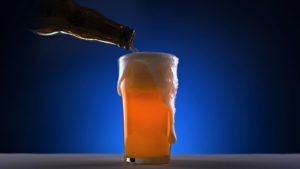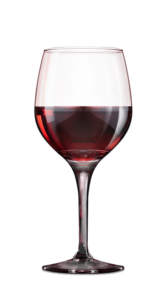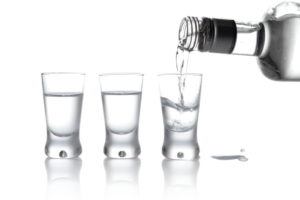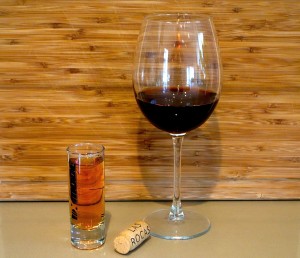(Medically reviewed by Dr. Zac Hyde M.D
Does alcohol cause erectile dysfunction?
That’s a loaded question, because it depends on how much you drink.
Fortunately, we have a new study that came out after this article was originally published that gives us a pretty straightforward answer.
So here’s the latest update to this blog post:
The paper I’m referring to was a meta-analysis of 24 separate studies that included a total of 154,295 subjects.
The results of the analysis demonstrated that moderate drinking was correlated with a decreased risk of developing ED in human males (source).
And even more interesting, moderate drinking according to this study equaled 21 drinks a week, or an average of 3 drinks a day.
Now, before you get too excited…
We need to define what one drink actually is, because based on my experience most drinks contain the alcohol equivalent of closer to 2 drinks.
The Big Bloke 22 oz beer from the Outback restaurant is a good example of this.
Ditto for a strong pour of wine or spirits at your favorite restaurant or bar.
So here’s the standard definition of one drink:
An alcoholic beverage should contain no more that 14 grams of pure alcohol.
And remember this does not mean 14 grams of total liquid, this means the absolute total amount of alcohol in the beverage.
Examples of this include:
12 ounces of regular beer averaging 5% alcohol

If you’re a beer drinker, keep in mind that many craft beers exceed 5 percent, so be mindful of this when tallying your numbers.
Popular national brands are usually close to the mark though.
Stella for example sits right at 5%.
A 5 oz glass of wine averaging 12% alcohol
Take a look at the image below and you’ll see that 5 ounces of wine is a standard sized wine glass filled about halfway to the top.

If you’re sipping from one of those gargantuan wine glasses you see in restaurants these days, you can’t cut that down by about 50 percent.
1.5 ounces of distilled spirits at 40% alcohol
This equals a standard 1.5 shot glass filled to the top.

If you drink stronger spirits, such as Wild Turkey 101, which has an ABV over 50%, you’ll need to adjust your numbers accordingly.
Alcohol, Erectile Dysfunction and Male Hormones
Now that you’ve been given a hall pass from an erectile standpoint to consume 21 drinks a week, the big question now is, should you?
Probably not.
Especially if you have a history of substance abuse in your family.
You should also think twice if you have low testosterone, because daily alcohol consumption will definitely make the problem worse.
There’s also some very compelling evidence that the more you drink, the higher your cancer risk.
Liver cancer is the most common form for heavy drinkers, but cancers of the mouth, throat, voice box, and esophagus also increase.
Alcoholic beverage high in polyphenols such as dark beer, bourbon and red wine contain anti-tumor compounds which reduce the risk.
So if you do drink regularly, focus on beverages with a with deep dark color.
Alcohol and ED – The Take home
A heavy alcohol binge can suppress testosterone levels for up to 3 weeks, so frat house levels of drinking should definitely be removed from the table.
If you decide to drink moderately on a regular basis, try to limit yourself to 2-3 drinks, three times times a week, max.
If you’re a daily drinker, and have no plans to quit focus on the beverages high in polyphenol mentioned above to reduce your cancer risk.
And keep the weekly limit of 21 drinks in mind.
And last but not least, make sure you play some defense so your testosterone doesn’t take too much of a hit.
Does Alcohol Cause Erectile Dysfunction Part 2:
One of the most common questions I get is…does alcohol cause erectile dysfunction?
The trouble with getting a straight answer to this question is that neither alcohol or sex are topics that get a lot of straight answers.
Both topics are encumbered with political, moralistic and religious interference that makes pure research hard to conduct, and unbiased reporting almost impossible to find.
But I’ve done my best to cut through the BS and find the closest thing I can to the truth on this matter…

Let’s take a look…
Does Alcohol Cause Erectile Dysfunction – The Case for Yes.
Shakespeare said that wine gives us the will for sex, but robs us of the capacity.
Which brings me to a study out of the University of Washington that found that sober men could achieve an erection more quickly than intoxicated men.
They also found a close connection between excessive drinking and being unable to achieve an erection at all.
In the short term, too much alcohol can inhibit your ability to perform in bed because it turns out that getting blotto makes you worse at most things.
This comes from a variety of factors, including but not limited to:
• Less skin sensitivity
• Hormonal disruptions
• Reduced attention span
• Reduced motor coordination
• Decreased blood flow to the penis
In the long term, other research found that men with alcohol dependencies are 60 to 70 percent more likely to have sexual problems.
Including erectile dysfunction, premature ejaculation, testicular atrophy and loss of sexual desire, than those who either did not drink, or drank only moderately (source).
Does Alcohol Cause Erectile Dysfunction – The Case for No
There are both physical and psychological ways alcohol might actually enhance your performance in the sack, all of which relate back to what causes your erectile issues in the first place.
Psychologically, a drink or two can help you relax. Emotional issues, stress, performance anxiety and similar psychological causes of erectile dysfunction can fade as that relaxation happens.
And with these emotional causes happily intoxicated in a corner of your mind, you can get right down to business.
For the physical part, you might remember the body of research that came out around 15 years ago showing that a glass of red wine could reduce cardiovascular disease risk.
This came as a surprise to many, but the science was pretty clear. Alcohol, when taken in moderation, reduces your risk of suffering a future cardiovascular event.
And remember, erections rely on blood flow and poor cardiovascular health can limit blood flow to your groin area and interfere with sexual potency.
So anytime you improve your cardiovascular health you improve your ability to achieve an erection, even if that improvement comes from a moderate daily dose of alcohol (source).
Does Alcohol Cause Erectile Dysfunction – The Case for Maybe
Most of the case studies around this topic did a poor job of separating alcohol itself from behaviors surrounding alcohol addiction.
For example, the study mentioned above that found that men with alcohol addictions also suffer from sexual problems.
This seems pretty conclusive, until you take into account other common behaviors and issues associated with alcoholism:
• Reduced self-esteem
• Relationship problems
• Legal problems
• Financial issues
• Increased stress as alcohol impacts job performance
All of these factors cause stress which can impact sexual health, causing all three of the problems that particular study linked with alcoholism.
This begs the question: did the alcoholism cause the issue, or was it the emotional damage caused by the alcoholism?
Moderate Alcohol Consumption And ED
The bulk of the research seems to lean toward moderate alcohol consumption not being a cause of erectile dysfunction, but I think we need to keep an important point in mind….
Drinking to relax before sex might help on that night, but it does nothing to treat the psychological factors that might interfere with your sexual health.
People with alcohol dependencies – and people who might develop them – often drink as a way of coping with stress, relationship or intimacy issues, low self-esteem, trauma or mild-to-moderate mental disorders….
And all of these can be core factors contributing to erectile dysfunction.
So this may all boil to why somebody is drinking.
Having a drink with dinner because beer or wine tastes good is one thing, and not very likely to negatively impact your sexual health one way or the other.
But drinking because you don’t feel like you can handle life without some booze could well indicate emotional issues that could cause erectile dysfunction…and that’s before we bring the physical factors into the equation.
Does Alcohol Cause Erectile Dysfunction-Conclusion
As far as I can tell, the real takeaway here is the same advice we should all keep in mind about drinking in general:
Drink moderately. And don’t drink at all if you think you have a problem.
And if you’re dealing with emotional issues, such as depression, don’t use alcohol to self medicate because the fix will only last until the buzz wears off…and when it does, you’ll have a hard time getting it up.
But if you don’t have any major emotional issues…
A drink or three a couple of times a week isn’t going to cause long-term erectile dysfunction, though it might impair you on that night if you’re a lightweight.
On the other hand, excessive drinking, especially when combined with emotional problems, can lead to issues in both the short and the long term.
